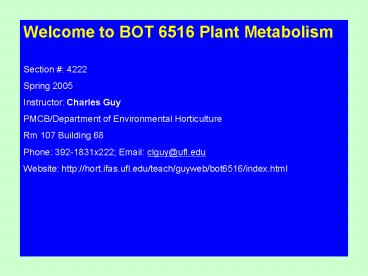Welcome to BOT 6516 Plant Metabolism PowerPoint PPT Presentation
1 / 7
Title: Welcome to BOT 6516 Plant Metabolism
1
Welcome to BOT 6516 Plant Metabolism Section
4222 Spring 2005 Instructor Charles
Guy PMCB/Department of Environmental
Horticulture Rm 107 Building 68 Phone
392-1831x222 Email clguy_at_ufl.edu Website
http//hort.ifas.ufl.edu/teach/guyweb/bot6516/inde
x.html
2
- Course Format
- Plant Metabolism is designed to focus on themes
of current interest in plant metabolism and
biochemistry. Since this is exclusively a
graduate level course, a dialogue between the
instructor and class members is not only
desirable, but required. There will not be
formal lectures, but instead we will have
discussion sessions focused around two major
metabolic/bioinformatics projects. I will lead
all class discussions. The material to be
discussed will be assigned in advance and will
come from either the primary text or from
supplemental materials. My role will be to
provide general background information, when
necessary, to make the reading material more
understandable and useful.
3
- Course Format
- There will be only the two class projects (100
points each) and a final exam (100 points).
Class participation will constitute 1/4 (100
points) of the grade.
4
- Major metabolic/bioinformatics project
- We are going to check and verify the annotations
of the gene sequences that encode enzymes of
intermediary metabolism at the KEGG and TAIR
databases. We are going to use our knowledge of
plant metabolism to correct and extend the
annotations of these two critically important and
key databases and current research working
websites. In order to do this, we will need to
be come knowledgeable about plant metabolism. I
will provide reference materials for each of the
pathways and cycles that will give you the
fundamental information you will need to begin
the annotation work.
5
- Major metabolic/bioinformatics project
- You will keep a research notebook that will allow
me to validate the annotation work that you have
done. You should keep a record of everything you
do. It must be organized and easy for me to
follow. - The annotation work, verification, correction,
and extension will be done as a group effort. I
will leave it up to each group as to how you will
divide up the work and compile the group report
on the assigned pathway. However, the work
should be divided equally. If any member of the
group fails to equally participate, I should be
informed immediately.
6
Major metabolic/bioinformatics project
URLs KEGG http//www.genome.jp/kegg/ TAIR
http//arabidopsis.org/index.jsp TAIR/Metabolism
http//arabidopsis.org/tools/aracyc/ PubChem
http//pubchem.ncbi.nlm.nih.gov/ Brenda
http//www.brenda.uni-koeln.de/ NCBI
http//www.ncbi.nlm.nih.gov/ NCBI/Nucleotide
http//www.ncbi.nlm.nih.gov/entrez/query.fcgi?dbN
ucleotideitooltoolbar NCBI/Blast
http//www.ncbi.nlm.nih.gov/BLAST/
7
Major metabolic/bioinformatics project Initial
Group Assignments Group I (Glycolysis from Glc
or Glc-1-P to Pyruvate) Karla Addesso,
Christopher Cerveny, Rebecca Schnelle Group II
(Pentose Phosphate Pathway cytosolic) Nicacio
Cruz-Huerta, Ji-Young Hong, Karthik-Joseph
John Group III (Calvin Cycle) Charles Hunter,
Yingnan Jiang, Thelma Madzima Group IV (TCA
Cycle) Stefanie Maruhnich, Scott Morris, Wei Pan

